Archive for May, 2011
Почему-то пространство и предметы в России ведут себе более коварно, чем в аккуратной Германии и других европейских странах. Даже такие безобидные штуки, как автомобильные навигаторы, темные силы превращают в России в мелких бесов. 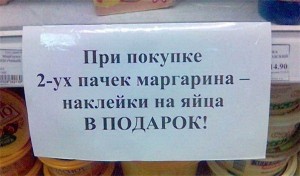
«Вот американский навигатор, произведенный в Тайване, управляется GlobalPositionsSystem. Казалось бы, нормальное, сугубо западное устройство. Но почему-то из Москвы в городок Новозыбков Брянской области оно вывело меня едва ли не через Киев. В место, до которого на самом деле неполных 600 километров, мне был предложен маршрут в 1000 километров с хвостиком. Я все же решил довериться старому доброму атласу автодорог, но ради развлечения не выключил электронного мерзавца…
…В России привыкаешь к тому, что постоянно откуда-то надо ждать сюрприза, неприятного, а иногда и смертельно опасного. Конечно, отсутствующие крышки люков на ранних ельцинских тротуарах позакрывали, но городская Россия (особенно Москва) осталось для меня сугубо ирреальным пространством…
Немцы привыкли, что жизнь определяется гарантиями и правилами без исключений. В России властвуют вероятности и невероятности….Говорят, что по-другому в России жить нельзя. Рискованно, зато с надеждой хоть когда-нибудь выпить шампанского. Русские первыми побывали в космосе, но когда летом отключают горячую воду, никто с уверенностью не может сказать, когда ее включат снова. Героическая, но нелепая страна».
Статья – – Штефан Шолль – Московский Комсомолец № 25650 от 25 мая 2011 г. Stefan Scholl Moskovskij Komsomolets
Serbia, Mladic in exchange for EU membership?
26 May 2011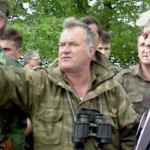
From EuroNews
The arrest of Ratko Mladic is certainly a major step towards a faster integration of Serbia within the EU. His detention has also closed a bloody chapter in the former Yugoslav history, bringing the region closer to reconciliation.
The full co-operation with the International Criminal Tribunal for the former Yugoslavia (ICTY) is the main pre-condition for the negotiations with Brussels. The EU signed a so-called Stabilisation and Association Agreement (SAA) – including an interim deal aiming to facilitate economic and trade relations – with Serbia in April 2008, but then decided to freeze it under Dutch pressure. Only in December 2009 the Netherlands put aside objections related to Belgrade’s performance on war crimes probes.
General Mladic led the militia of the breakaway Republica Srbska, which sought to impose a Serbian identity on the multi-ethnic state of Bosnia; he was the architect of ethnic-cleansing schemes that included the Siege of Sarajevo and the 1995 Srebrenica Massacre in which about 8,000 Bosnian Muslim men were systematically executed. He was indicted by the UN war crimes tribunal in The Hague in 1995 for genocide and other crimes.
The hunt for Mladic started already at the end of 1995. Many observers in Serbia and in the EU suspect that the general has been protected for years by Serbian security forces loyal to President Slobodan Milosevic, who was ousted from power in October 2000. Mladic’s former political master Radovan Karadzic was arrested in 2008 and is still in The Hague.
By the end of the year, after so long negotiations, Serbia will have the chance of formally becoming an EU membership candidate and getting a starting date for accession talks. Serbian President Tadic rejected criticism that Belgrade had only taken action following international pressure and had not calculated when to arrest Mladic, who is considered a hero by local nationalists. But there are still too many unanswered questions.
The European integration of Serbia, Bosnia, and Kosovo is the promise in exchange for concessions to old enemies and the achievement of a complete stable peace in the region. The problem is, however, to understand whether the 27 are ready to accept new members, who have such big open questions in their recent history.
Giuseppe D’Amato
Итальянцы останутся голодными в Москве.
14 May 2011Московские кафе и рестораны шокируют своим сервисом и качеством блюд.
«Для моего друга Джузеппе по прозвищу Панчо, эксперта в области траста на национальном уровне, сомнений быть не может: кухня — прежде всего! Его вопросы о том, “что есть вкусненького в России”, непрерывны, как и обещание приехать в Москву ко мне в гости…

- Итальянский Панчо
Панчо счастливо женат. Жена завоевала его “через желудок”, готовя обеды и ужины, походящие на лукулловы пиры времен Римской империи. Его девиз: “Кухня — это любовь, любовь — это жизнь, кто не умеет готовить — не умеет любить”. Во времена студенческой жизни он перестал дружить с одной красавицей, узнав, что та кладет в один популярный итальянский соус сосиски, а не положенный по рецепту бекон…»
«Я занял место в очереди, затем выбрал салат “Столичный”. Девушка за прилавком взяла тарелку и поставила ее на весы. В первый момент я подумал, что она это сделала из-за отсутствия места на прилавке. Но затем девушка начала борьбу с горошком, который никак не хотел оставаться в тарелке, а стрелки весов крутились, как у компаса на Северном полюсе. Я спросил, что происходит, и девушка объяснила, что она старается добиться нужного веса. Как каждый нормальный итальянец, я подумал, что она, наверное, чокнутая! Хотя чокнутые на самом деле хозяева….Мне трудно даже представить выражение лица Панчо, если бы какой-нибудь официант начал подсчитывать микрограммы на его тарелке. Также, боюсь, он бы вряд ли оценил, если бы кто-то предложил ему тарелку спагетти с кетчупом…
“Ничего особенного” — так нам сказал недавно хорошо одетый мужчина в центре Москвы у входа в украинский ресторан, отвечая на вопрос о качестве кухни. В грузинских ресторанах Москвы, правда, я всегда хорошо себя чувствовал. Но такой знаток, как Панчо, конечно, захочет попробовать что-то из русской кухни…
Но вот вам еще одно интересное наблюдение иностранца: когда выезжаешь за пределы Москвы, ситуация с общепитом удивительным образом меняется в лучшую сторону! Например, в Твери есть немало мест с очень хорошей кухней, да и кофе там ничуть не уступает по качеству среднеевропейскому. Кажется, что находишься на другой планете. Качество и выбор предлагаемых блюд значительно лучше столичного, практически европейский. И это не единичный случай…В общем, мне все понятно. Если я не хочу рисковать своей дружбой с Панчо, жаждущим познакомиться с настоящей русской кухней, мне придется уехать с ним в провинцию. Москвичи же пока приговорены к безликой кулинарной “каше” и скоро станут американцами. Good Bye!»
Статья – Джузеппе Д’Амато – Московский Комсомолец № 25641 от 14 мая 2011 г. Giuseppe D’Amato – Moskovskij Komsomolets
Appena avuta la certezza che l’arabo ucciso ad Abbottabad era Osama Bin Laden il presidente Obama ha subito telefonato a Mosca prima di darne notizia in un discorso televisivo al Paese. L’11 settembre 2001 era stato Vladimir Putin, il primo leader straniero, a contattare George Bush, rinchiuso sull’Air One in volo per motivi di sicurezza. Il favore è stato ricambiato adesso, nove anni e sette mesi dopo.
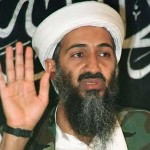
Osama Bin Laden
Le due superpotenze del Ventesimo secolo sono stati infatti i Paesi maggiormente colpiti dal terrorismo internazionale. Il Cremlino aveva avvertito per tempo la Casa bianca negli anni Novanta che la jihad islamica, armata precedentemente in funzione anti-sovietica, era sfuggita di mano ai finanziatori occidentali. Fu così l’ex Kgb a dare a Washington le coordinate di dove si trovassero i campi di addestramento dei terroristi in Afghanistan nell’estate del 1998, pochi giorni dopo che Al Qaida aveva fatto esplodere in un attentato le ambasciate Usa in Africa orientale. Gli Stati Uniti si fidavano, però, allora molto di più degli alleati regionali, i pakistani, che degli ex avversari della Guerra Fredda.
I russi in realtà non hanno mai distolto la loro attenzione dall’Afghanistan anche dopo il ritiro del febbraio 1989. Quando il 27 settembre 1996 i talebani presero Kabul Mosca organizzò una riunione d’emergenza delle repubbliche ex sovietiche asiatiche in cui avvertì gli ex fratelli del pericolo. Seguirono ripetute campagne armate degli islamisti nel cuore del continente, mentre Bin Laden continuava l’invio di suoi uomini in Cecenia, visitata in precedenza dal “numero due” di Al Qaida l’egiziano al Zawahiri.
Oggi la strategia di Barack Obama è di ritirare rapidamente le truppe Usa dai vari teatri di guerra per risparmiare preziosi dollari necessari a ripianare l’immenso debito statale ereditato dall’Amministrazione Bush. Solo così l’America potrà rispondere in un futuro prossimo alla sfida cinese e della globalizzazione in generale. Che siano ora gli alleati vecchi e nuovi ad iniziare a cavarsela da soli, si pensa a Washington. Emblematica è l’uscita di scena americana alla chetichella dal conflitto in Libia.
La morte di Bin Laden segna uno spartiacque nella politica internazionale. Il capo dei terroristi è stato liquidato e i suoi seguaci “arabi” nella regione sono in rotta. “Giustizia” per i cittadini americani, morti l’11 settembre, è stata fatta. L’“exit strategy” dall’Afghanistan, resa nota al vertice Nato di Lisbona lo scorso autunno, può pertanto iniziare come previsto nel 2014.
La telefonata di Obama a Dmitrij Medvedev, buttato giù dal letto prima dell’alba, non è solo un giusto ricambio di cortesie ricevute ma anche l’annuncio del prossimo passaggio di consegne. Fra il 2011 ed il 2014 si tenterà di trovare una soluzione politica per l’Afghanistan, poi gli occidentali se ne andranno. La “patata bollente” tornerà così nelle mani del Cremlino. Ma la Russia odierna ha la forza ed il prestigio di tenere sotto controllo un’area così estesa ed esplosiva come l’Asia centrale? A Mosca a dubitarne sono numerosi specialisti che affermano sicuri: senza un Afghanistan pacificato difficilmente ci sarà pace per i Paesi limitrofi. Il rebus su come fare è aperto a tutti.
Giuseppe D’Amato
The Polish Constitution of May 3, 1791, was the first Fundamental Law adopted in Europe and the second world’s Constitution after that of the United States in 1787. The document was a secret project and its final version was drafted among others by the politician and thinker Hugo Kołłątaj.
The Sejm session which led to the adoption of the Constitution was held in an atmosphere of a coup d’état. Many deputies came to the Royal Castle in Warsaw, where the session was taking place, in secrecy and the castle was guarded by numerous troops. After a heated, but short debate, the Fundamental Law was adopted with a majority of votes.
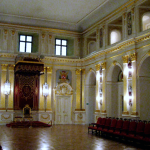
- Chamber of Senate at the Royal Castle in Warsaw – wikipedia.org
The Constitution of 1791 comprised 11 articles. It introduced the principle of independence for the nobility and townspeople and the separation of powers between the Legislature (a bicameral Sejm), the Executive and the Judiciary branches.
Peasants came under the protection of the law and government. This was the first step toward the ending of serfdom. The Constitution provided for “ordinary” meetings of the Sejm once in two years and special sessions when required by national emergency. The Lower Chamber, called the Chamber of Deputies, was made up of 204 deputies and plenipotentiaries of 24 royal cities. The Upper Chamber of Senators comprised 132 senators, including province governors, castellans, government ministers and bishops. The Constitution abolished the liberum veto.
The Executive power was in the hands of a royal Council, known as the Guardians of the Laws. This Council was presided over by the King and included five ministers appointed by him: the minister of police, the minister of the seal (internal affairs), the minister of the seal of foreign affairs, the minister of war, and the minister of the Treasury. The decrees issued by the King required countersignature by a minister.
To enhance the unity and security of the Commonwealth, the Fundamental Law abolished the Union of Poland and Lithuania in favour of a unitary State. This decision was the end of the Union of the Crown of Poland and the Grand Duchy of Lithuania, which had been established in 1569. The Constitution changed the free royal election system to a dynastic elected monarchy, which was meant to reduce the influence of foreign powers in royal elections.
The Constitution acknowledged the Roman Catholic faith as the dominant religion, but at the same time it guaranteed freedom to all religions.
The Constitution of May 3rd remained an unfinished work. It was in effect for only one year before Poland lost its independency. The last attempt at preserving the its legacy was the insurrection led by Tadeusz Kościuszko. In 1794, in Cracow, he issued the unprecedented “Proclamation of Połaniec,” granting freedom and ownership of land to peasants who fought in the insurrection. The insurgents had some initial victories, but then the armies of Russia, Austria and Prussia launched a military crackdown. The defeat of Kościuszko’s forces led in 1795 to the third and final partition of Poland.
May 3rd was restored as an official Polish holiday in April 1990, after the fall of communism. In 2007, May 3rd was in addition declared a Lithuanian national holiday. The first joint celebration by the Polish Sejm and the Lithuanian Seimas took place on May 3rd, 2007
La Wadowice del Beato Giovanni Paolo II
1 May 2011 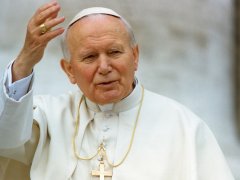 Wadowice. Centinaia di bambini si addensano in file poco ordinate e chiassose. L’attesa è lunga, ma non troppo. L’atmosfera è quella tipica delle gite scolastiche. In ulitsa Koscielna (ossia della Chiesa) numero 7 pellegrini e studenti in erba si mischiano davanti alla casa natale di Karol Wojtyla. Qui, il 18 maggio del 1920, nacque il futuro Papa. Al primo piano dell’edificio una suora, che parla anche in italiano, invita i visitatori a mettere delle pantofole per non sporcare i pavimenti. Le pareti sono piene di foto di Giovanni Paolo II, le bacheche contengono libri e documenti. Non mancano nemmeno i giornali, soprattutto quelli riguardanti l’attentato del 1981.
Wadowice. Centinaia di bambini si addensano in file poco ordinate e chiassose. L’attesa è lunga, ma non troppo. L’atmosfera è quella tipica delle gite scolastiche. In ulitsa Koscielna (ossia della Chiesa) numero 7 pellegrini e studenti in erba si mischiano davanti alla casa natale di Karol Wojtyla. Qui, il 18 maggio del 1920, nacque il futuro Papa. Al primo piano dell’edificio una suora, che parla anche in italiano, invita i visitatori a mettere delle pantofole per non sporcare i pavimenti. Le pareti sono piene di foto di Giovanni Paolo II, le bacheche contengono libri e documenti. Non mancano nemmeno i giornali, soprattutto quelli riguardanti l’attentato del 1981.
“Tutto sommato, la Polonia e la sua Chiesa hanno superato bene la morte del Santo Padre”, osserva il noto intellettuale cracoviese, Jan Prokop. Non erano pochi, soprattutto tra i prelati locali, a prevedere scenari inquietanti. “La scelta di un successore tedesco – continua il professor Prokop – non ha creato malumori. Con i vicini tedeschi si sono combattute in passato tante guerre. Ma il cardinale Joseph Ratzinger è stato per anni uno dei più stretti collaboratori di Wojtyla e ha ricordato più volte nei suoi discorsi pubblici il Papa polacco”. Bisogna anche aggiungere che il fedele segretario particolare del Pontefice defunto, monsignor Stanislao Dziwisz, è stato nominato da Benedetto XVI arcivescovo di Cracovia. Un vero e proprio segnale di continuità.
Giovanni Paolo II si è congedato dai suoi connazionali con una serie di pubblicazioni, che sono andate letteralmente a ruba. Veri e propri bestsellers che la gente conserva con cura. La “guida morale” per oltre 26 anni ha traghettato il Paese slavo fuori dalle secche del comunismo ed è intervenuto pesantemente nella primavera del 2003, quando la Polonia, come al solito frammentata al suo interno e con una fronda cattolica conservatrice contraria, ha scelto tra l’adesione all’Unione europea ed il nulla.
Cracovia è come sempre splendida. Il castello del Wawel, dove batte il cuore della Polonia, e la piazza del Mercato danno lustro ad una delle capitali della cultura europea. E’ un pullulare di gente proveniente da ogni angolo del mondo. L’organizzazione è più che buona. Il sorriso e il senso dell’ospitalità accompagnano ovunque il visitatore.
Il turismo religioso, legato a Giovanni Paolo II, è discreto. Gadget e foto sono venduti in buon numero, ma senza eccessiva materializzazione. L’Ente del turismo di Cracovia propone il percorso papale, una mezza giornata, a cifre non piccole, ben più care della visita al campo di sterminio di Auschwitz. Per il viaggiatore “fai da te” non sono facili da trovare i pulmini bianchi che percorrono i quaranta chilometri che separano Cracovia da Wadowice. La strada è stretta e pericolosa. Ci vuole quasi un’ora e venti e tanta pazienza per sopportare il caldo appiccicoso.
Nella piazza principale di Wadowice, cittadina abitata da poche migliaia di persone, la chiesa della Madonna di Soccorso esibisce sulla facciata un paio di grandi stendardi vaticani ed un busto raffigurante Giovanni Paolo II ricolmo di fiori. All’interno del tempio alcuni paramenti del Santo Padre sono già reliquia. L’emozione per la morte di Karol Wojtyla è ancora forte. A Wadowice, però, adesso vi è coscienza che nel 1920 è nato un santo.
Giuseppe D’Amato
da L’EuroSogno e i nuovi Muri ad Est. Greco&Greco editori, Milano 2008. PP. 353-354.
* * *
Come ha dichiarato il parroco della Basilica di Wadowice, Jakub Gil, le tradizionali Serate “papali” saranno anticipate dalle 20.00 alle 18.00. La scelta dell’ora era dettata dalla decisione di terminare la celebrazione all’ora del ritorno del Pontefice nella Casa del Padre, ossia alle 21,37. Dopo la beatificazione negli incontri si porrà minor attenzione all’aspetto della salita al Cielo di Karol Wojtyla quanto all’elevazione agli altari ed alla gioia della benedizione.
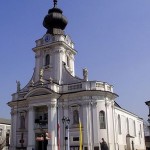
- Basilica della Beata Vergine Maria
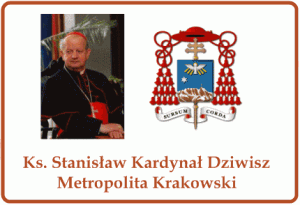 “Na pełną konsekwencję wiary Jana Pawła II, jego skoncentrowanie się na Bogu i sprawach człowieka oraz wierność w przyjaźni wskazał w swej improwizowanej wypowiedzi podczas czuwania modlitewnego w Circo Massimo wieloletni sekretarz osobisty Jana Pawła II, kard. Stanisław Dziwisz.
“Na pełną konsekwencję wiary Jana Pawła II, jego skoncentrowanie się na Bogu i sprawach człowieka oraz wierność w przyjaźni wskazał w swej improwizowanej wypowiedzi podczas czuwania modlitewnego w Circo Massimo wieloletni sekretarz osobisty Jana Pawła II, kard. Stanisław Dziwisz.
Kard. Dziwisz powiedział o swoim pierwszym spotkaniu z ks. Karolem Wojtyłą jako młodym profesorem Wyższego Seminarium Duchownego w Krakowie. Podkreślił jego doskonałe przygotowanie merytoryczne i ciekawe wykłady. Uderzające było to, że często udawał się do kaplicy, długo się modlił, i kiedy wracał po przerwie na wykład odnosiło się wrażenie, że kogoś spotkał, że rozmawiał z Bogiem. „Na nas młodych klerykach sprawiało to ogromne wrażenie” – wyznał metropolita krakowski, dodając, że takie było całe jego życie, a ta jego duchowość pogłębiła się jeszcze, kiedy został papieżem. Rozwijała się w nim nieustannie miłość do Boga i do człowieka, zwłaszcza do młodych.
Prowadząca spotkanie dziennikarka zapytała kard. Dziwisza o to, czy widział kiedyś Jana Pawła II zdenerwowanego. Odpowiadając – wyznał, że owszem, ale nigdy na jakiegoś konkretnego człowieka, gdyż “Ojciec Święty zawsze szanował człowieka”. Ale w Agrygencie, w 1993 roku zdecydowanie potępił mafię. „Tak krzyknął, aż się wszyscy przestraszyliśmy” – wyznał kard. Dziwisz. Drugim razem – papież podniósł głos przed modlitwą „Anioł Pański”, kiedy w roku 2003, na krótko przed wojną w Iraku apelował o podjęcie negocjacji….
Nie zabrakło pytania o relacje Jana Pawła II z socjalistycznym prezydentem Włoch, Sandro Pertinim, który po zamachu 13 maja 1981 odwiedził Ojca Świętego w klinice Gemelli. Kard. Dziwisz wyznał, że już podczas pierwszego spotkania z prezydentem Włoch zawiązała się więź przyjaźni, a Karol Wojtyła był wiernym przyjacielem, dlatego nawet wówczas, gdy mówiono że, nie można Pertiniego odwiedzić w szpitalu papież uważał, że musi to uczynić. Pertini w rozmowie z kard. Dziwiszem zawsze przyznawał się do swego chrześcijaństwa….”.
franciszkanska3.pl – KAI
Welcome
We are a group of long experienced European journalists and intellectuals interested in international politics and culture. We would like to exchange our opinion on new Europe and Russia.
Categories
- Breaking News (11)
- CIS (129)
- Climate (2)
- Energy&Economy (115)
- EU Eastern Dimension (85)
- Euro 2012 – Sochi 2014 – World Cup 2018, Sport (43)
- Euro-Integration (135)
- History Culture (198)
- International Policy (261)
- Military (74)
- Interviews (18)
- Italy – Italia – Suisse (47)
- Odd Enough (10)
- Poland and Baltic States (126)
- Religion (31)
- Russia (421)
- Survey (4)
- Turning points (4)
- Ukraine (176)
- Российские страницы (113)
Archives
- November 2020
- October 2020
- September 2020
- August 2020
- July 2020
- May 2020
- April 2020
- March 2020
- January 2020
- December 2019
- November 2019
- October 2019
- September 2019
- August 2019
- July 2019
- June 2019
- May 2019
- April 2019
- March 2019
- February 2019
- December 2018
- November 2018
- October 2018
- September 2018
- August 2018
- July 2018
- June 2018
- May 2018
- April 2018
- March 2018
- February 2018
- January 2018
- December 2017
- November 2017
- October 2017
- September 2017
- August 2017
- July 2017
- May 2017
- March 2017
- January 2017
- December 2016
- November 2016
- October 2016
- September 2016
- July 2016
- June 2016
- May 2016
- April 2016
- February 2016
- January 2016
- November 2015
- October 2015
- September 2015
- June 2015
- April 2015
- March 2015
- February 2015
- January 2015
- December 2014
- November 2014
- October 2014
- September 2014
- August 2014
- July 2014
- June 2014
- May 2014
- April 2014
- March 2014
- February 2014
- January 2014
- December 2013
- November 2013
- October 2013
- September 2013
- August 2013
- July 2013
- June 2013
- May 2013
- April 2013
- March 2013
- February 2013
- January 2013
- December 2012
- November 2012
- October 2012
- September 2012
- August 2012
- July 2012
- June 2012
- May 2012
- April 2012
- March 2012
- February 2012
- January 2012
- December 2011
- November 2011
- October 2011
- September 2011
- August 2011
- July 2011
- June 2011
- May 2011
- April 2011
- March 2011
- February 2011
- January 2011
- December 2010
- November 2010
- October 2010
- September 2010
- August 2010
- July 2010
- June 2010
- May 2010
- April 2010
- March 2010
- February 2010
- January 2010
- December 2009
- November 2009
- October 2009
- September 2009
- August 2009
Our books




